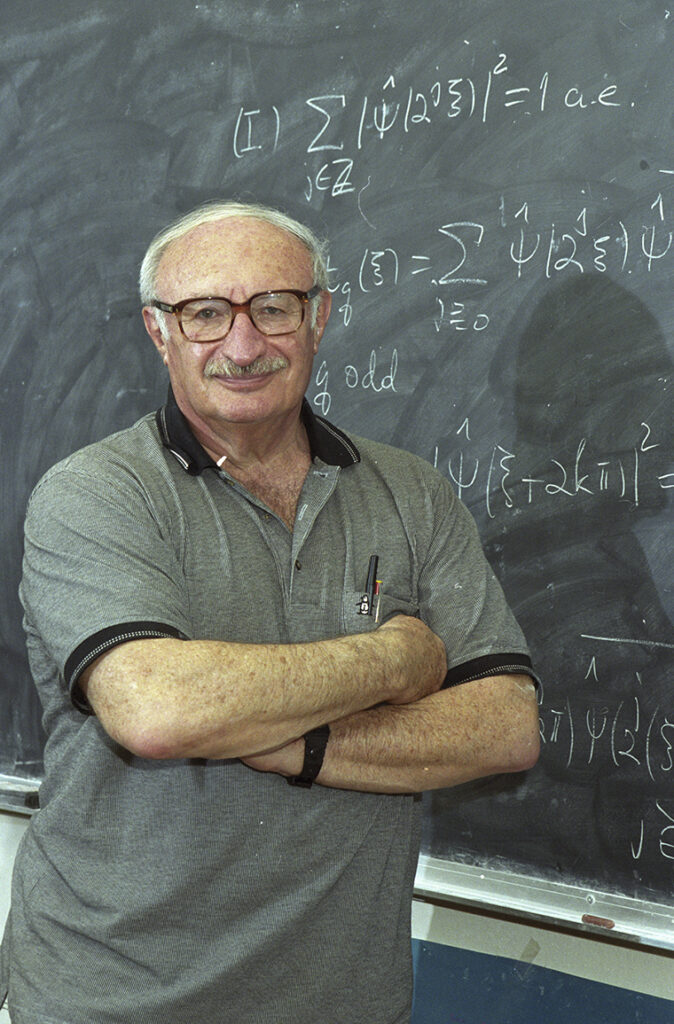
Guido L. Weiss, the Elinor Anheuser Professor Emeritus of Mathematics in Arts & Sciences at Washington University in St. Louis, died Dec. 25, 2021, of Alzheimer’s disease. Weiss was a prominent mathematician, former chair of the Department of Mathematics and an active member of the university community. He was 92.
Weiss was born in Trieste, Italy, where his parents, Eduoardo and Vonda Weiss, both worked as psychiatrists. Eduoardo was a well-known psychoanalyst and collaborator of Sigmund Freud. The course of Weiss’ young life was altered by the rise of fascism and anti-Semitism in Europe that led to World War II. In 1938, Weiss was forced to leave public school because he was Jewish. He attended a Jewish school in Rome until the end of 1939, when his father was sponsored by members of the Menninger family to come to America. The family settled in Topeka, Kan., and eventually moved to Chicago.
Weiss studied at the University of Chicago, earning his bachelor’s, master’s and PhD degrees in mathematics. He was also an accomplished college athlete, playing for his university’s baseball, basketball and football teams, as well as playing summer baseball in the Great Lakes region minor league system.
Weiss taught at DePaul University before joining Washington University in 1961 as an associate professor. He became a full professor in 1963 and served as chair of the mathematics department from 1967-1970. In all, he spent 52 years at Washington University.
A theoretical mathematician, Weiss was an expert in analysis, especially Fourier analysis and harmonic analysis, as well as interpolation of operators. In 1967, Weiss won the Chauvenet Prize from the Mathematical Association of America for his article on harmonic analysis. A fellow of the American Mathematical Society, Weiss also was a visiting professor at several universities around the world and received honorary degrees in Milan, Italy, and Barcelona, Spain.
His influence and impact affected generations of students and mathematicians. In addition to his university committee work and service on the Faculty Council and Faculty Senate Council, he was known to give his time generously, including joining students on the Danforth Campus for Shabbat dinner at the Chabad House and sharing his personal story.
“Guido gave the mathematics department world stature with his outstanding research and his ability to make contacts with renowned mathematicians in the United States, Europe, South America and China, who then encouraged their students and postdocs to go to Washington University to continue their studies,” said Gary Jensen, professor emeritus of mathematics and statistics in Arts & Sciences.
“An accomplished athlete, Guido was appointed by Chancellor William Danforth in the early ’80s to chair a committee to recommend revision and expansion of the athletic facilities,” Jensen said. “His service within the department was unparalleled, from mentoring colleagues, graduate students and postdocs, to creating the Freshman Seminar. It is difficult to comprehend the magnitude of Guido’s impact on Washington University.”
Weiss is survived by his wife, Barbara Weiss, who worked as a microbiologist and virology researcher at the School of Medicine for more than 25 years; his two sons, Paul and Michael Weiss; and grandson, August Gremaud. All are Washington University graduates.
A memorial service and a mathematics conference celebrating Weiss will be organized for a later date. The family requests that gifts in his honor be directed to the Oasis Institute or the Innocence Project.